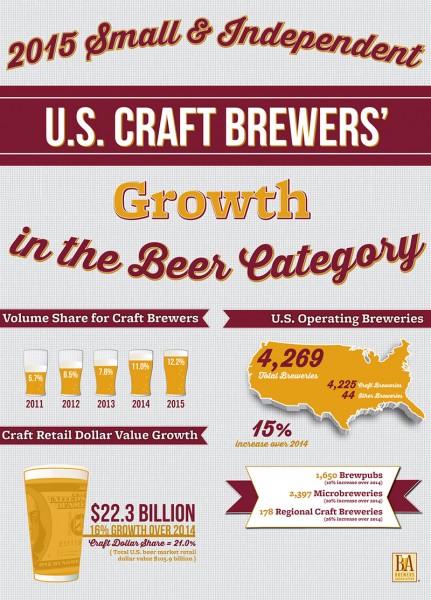The craft beer scene is booming -
with more than 4,200 breweries In the US, small and independent craft brewers
now have a 12 percent market share! Not only do some breweries offer organic
beer, many breweries also have high sustainability standards - from being
powered by solar energy to recycling local grain for the brewing process.
 |
| Image Credit: Brewer’s
Associations |
Organic Beer 101
According to Food Republic the
organic craft beer industry has grown by more than $30 million in the last
decade. Oregon even has an annual Organic Beer Fest designed
to raise awareness about organic beer and sustainable living.
Organic beer is healthier and
contributes to sustainability. It just makes you feel better about what you're
drinking. But then why is it relatively hard to find?
It’s a well-known fact that being
certified organic is demanding and expensive. To make things even more
complicated, as of January 2013, a beer needs both certified organic
hops and yeast to qualify.
Fortune.com reports
that some organic brewers are making things even more difficult for themselves
supply-wise. California’s Dr. Jekyll’s uses
not only organic traditional ingredients, but also super foods, such as acai
berry, turmeric and algal oil. “We’ve taken three high growth markets – craft
beer, organic and nutraceuticals
[KSL1] – and combined them into one product,” says
Tom Costa, president & CEO at Dr. Jekyll’s.
Still, there are many breweries
who decided to go organic against all odds - here are some of our North Carolina
favorites who offer organic brews:
Mother Earth Brewing,
Kinston, NC
Pisgah Brewing Company, Black Mountain, NC
Weeping Radish Farm Brewery, Grandy,
NC
Lenny Boy Brewing Company, Charlotte,
NC
If you're interested in finding
out more about the growing local North Carolina craft beer industry, check out
the documentary Brewconomy.
Beer made with renewable energy
Some breweries are taking sustainable brewing to a whole new level - with renewable energy. The Outer Banks Brewing Station in North Carolina is powered by wind energy (the first one in the US!) They pride themselves in being innovative and conscious about the environment, while helping others learn as much as they can about renewable energy and sustainability. Their 10kW wind turbine will offset approximately 1.2 tons of air pollutants and 250 tons of greenhouse gases, according to their website.
Solar powered breweries are also
up and coming. This recently published list of the Top 40 Solar Beer
Breweries shows that "solar beer" is popular around the world.
North Carolina is listed 3 times! Sierra Nevada Brewery in Mills River
(Asheville), NC, Highland Brewing Company also in Asheville and Innovation
Brewing in Sylva, NC all boast solar PV systems.
 |
| Image Credit: Outer Banks Brewing Station |
Integrating recycling into Beer
brewing
Did you know that virtually all grain used in brewing
beer gets an afterlife? Most of it as feed for beef and dairy cows.
There are many more uses for it though - some finds its way into baked goods,
some is used in fertilizer, compost, even as a source of energy. And in case
you're wondering - the grain is alcohol-free when collected for farms.
Talking about recycling grains -
a brewery in Alaska "has installed a specially designed $1.8-million
boiler that basically takes the brewer’s leftover grain and burns it to
generate electricity. Hence, we guess you could say the brewery is now
'beer-run.' " (Source: Takepart.com).
LEED certified Breweries
According to the USGBC, the U.S. Green building Council
LEED certification ensures electricity cost savings, lower carbon emissions and
healthier environments for the places we live, work, learn, play and worship.
LEED’s global sustainability agenda is designed to achieve high performance in
key areas of human and environmental health, acting on the triple bottom line -
putting people, planet and profit first.
In 2013, Mother Earth, whose
founders were committed to environmental sustainability from the very start,
became the first brewery to attain LEED Gold
Certification.
Mother Earth installed innovative
eco-friendly solutions such as solar panels, recyclable carpet, eco-friendly
tile, and insulation made of blue jeans. Eco-flush toilets save hundreds
of gallons of water each year, and run on rain water collected in a
cistern. The brewery also recycles everything from spent grain (feed for
cattle) and the bags the grain comes in (converted to stylish shopping bags by
local artisans) to the old wooden bourbon barrels the brewery uses for aging
(converted to building materials and art pieces displayed throughout the
facility).
Mountain X recently
published an article announcing that, "Sierra Nevada Brewing Co.’s Mills
River production facility in North Carolina was recently awarded the
U.S. Green Building Council’s top certification (Platinum) for
environmental responsibility in design, construction methods and ecologically
sustainable practices.
 |
Mills River Production Facility Parking Lot with
Solar Panels (Image Credit: Sierra Nevada)
|
Sierra Nevada implemented a number of creative measures that were rewarded in the scoring process, including the installation of two Capstone microturbines. The machines harness the methane produced by the brewery’s on-site wastewater treatment plant for electricity generation to complement that produced by solar arrays in the public parking area and across two-thirds of the packaging facility’s roof."
As you can see, there is a lot of green innovation going on in the beer scene. If you have any favorite breweries not mentioned here or any other brewing innovation you may have observed, please comment below.


No comments:
Post a Comment